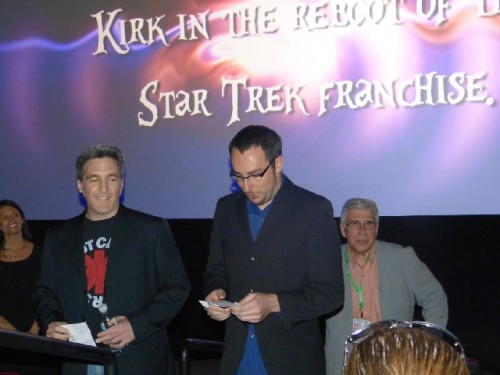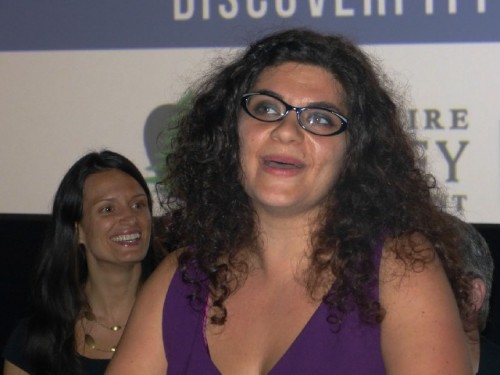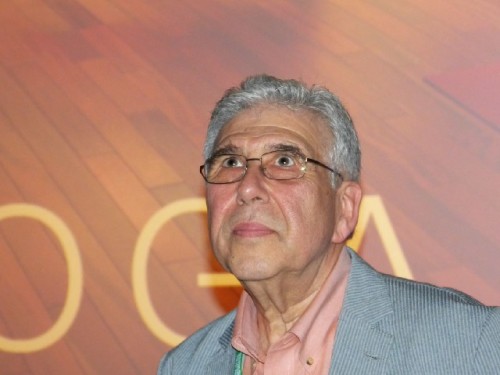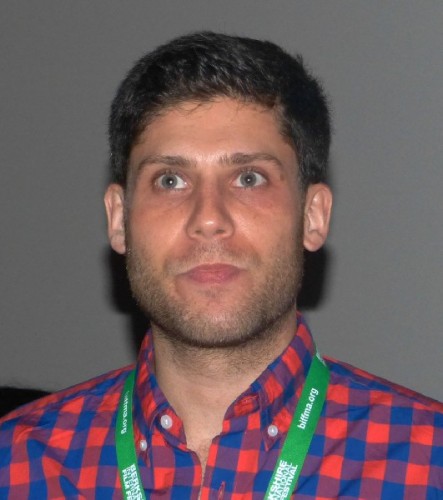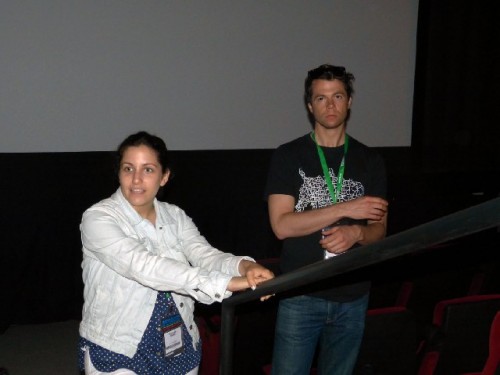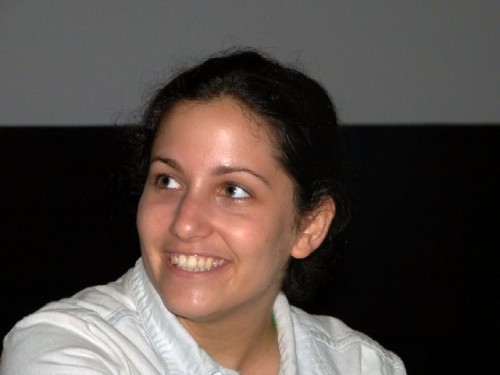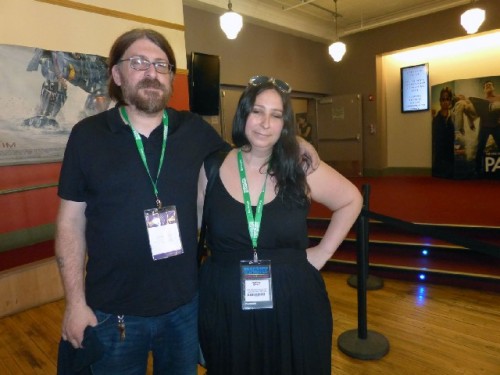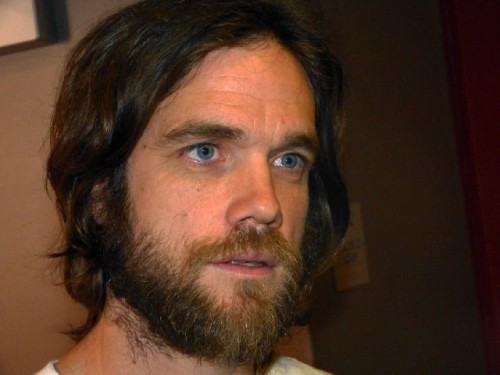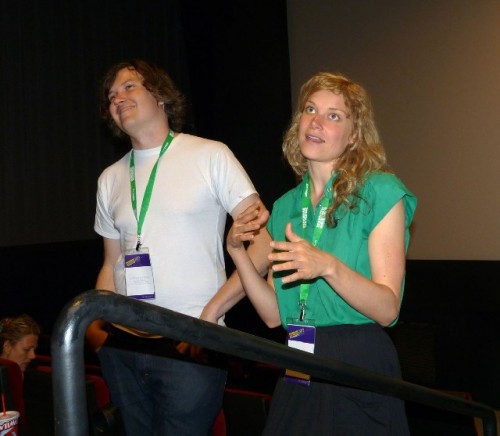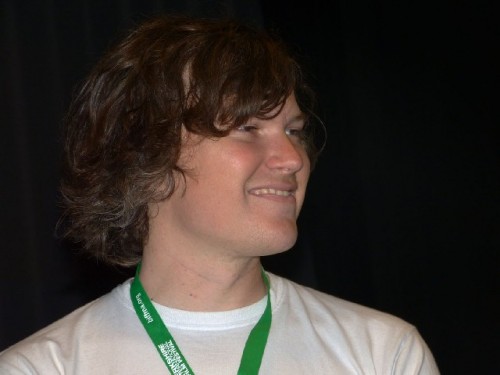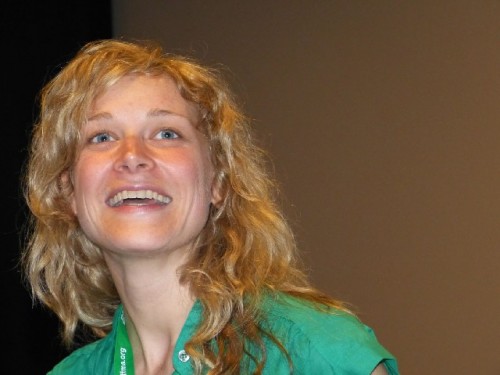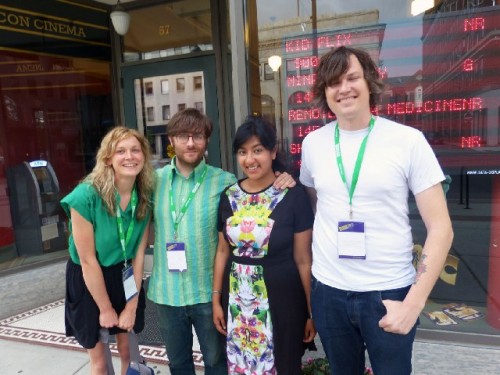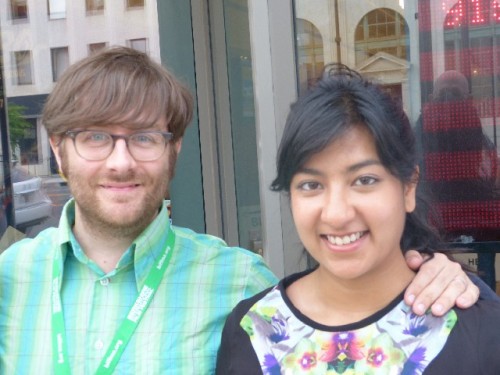2013 BIFF and That
8th Annual Berkshire International Film Festival
By: Charles Giuliano - Jun 03, 2013
From Friday with the Pittsfield opening night “The Spectacular Now” and the short film “The Cup Reader” through Sunday afternoon and “The Iran Job” we managed to see seven films combining documentaries and features as well as that one short film.
Between Pittsfield’s three screen of Beacon Cinema, as well as the Triplex and Mahaiwe in Great Barrington and a special program at The Mount there were 75 films during the four day, eight annual, Berkshire International Film Festival.
So while fully locked and loaded with just short breaks between screenings we are reporting on some 10% of what was presented. Had we the time and ability to dart about there is so much more that we would have enjoyed seeing.
Even given the limitations there was such an abundance of riches that every time slot represented three options. There were lively discussions and tough choices. Astrid and I agreed on what we finally opted for except the final screenings on Sunday. We decided to split up and then rendezvous.
There was uneven scheduling with her film “The Iran Job” starting at 3:45 and my choice “I, Anna” a mystery with Gabriel Byrne starting at 4. But there was a glitch and the digital projector had to be rebooted. After twenty minutes I gave up and caught the mid point of “The Iran Job” to stay in sync with dinner plans.
Sunday proved to be confusing. I was excited to see a documentary about a Chinese dissident “Transcending Fear” at mid afternoon. We learned that it had been cancelled because the filmmaker could not leave China to present and support the film.
The substitution “Ninah’s Dowry” a film from Cameroon which was also screened in Great Barrington, proved to be the most emotionally riveting and intense of our festival experiences. There were just a dozen or so individuals in the theater.
Checking e mail between Sunday screenings we received this press release from BiFF “Today, the Berkshire International Film Festival announced the winners of the annual BIFF Juried Prize Award and the BIFF/Berkshire Bank 'Next Great Filmmaker Award.' In the Juried documentary category, the winners were VALENTINE ROAD directed by first time director Marta Cunningham and GMO OMG directed by another first time filmmaker, Jeremy Seifert who was in attendance with his wife and three children. DIE WELT, from the Netherlands, won in the Juried narrative category from first time Dutch-Tunisian director Alex Pitstra. The Jury prize is sponsored by GWFF USA and was presented at a brunch Sunday at Allium Restaurant in Great Barrington. Serving on the BIFF Jury were actors Karen Allen, Mary Kay Place, and Peter Riegert, producer and distribution guru Josh Braun of Submarine Entertainment, Academy Award winning director Karen Goodman, director Matthew Penn, Screenwriter Sam Harper and renowned film critic and New York Film Festival director of programming, Kent Jones.
"The winner of the Berkshire Bank 'Next Great Filmmaker Award' was Suha Araj’s short film THE CUP READER. Director Suha Araj and producer Lydia Khoury were on hand to accept the award in a ceremony at the Beacon presented by Berkshire Bank during the Friday opening night in Pittsfield."
Seeing many films in a festival context requires absorbing a lot of information. It tends to put us in a different mode. There are brief interludes before the next one and one after that.
On Saturday, since Pittsfield, unlike Great Barrington did not have evening programming, after dinner we watched Michael Douglas and Matt Damon in the riveting HBO Stephen Soderbergh production of “Candelabra” an over the top bio pic of the closeted queen and Vegas pianist, Liberace, and his boy toy, twink, Scott.
Today’s headlines reveal that Douglas, who is in remission, caught his throat cancer through cunnilingus. That incredible, total gonzo performance of a lifetime by Douglas has simply blown the fuse, so to speak, of my critical faculties.
And who will ever soon forget Damon in a rhinestone studded g string.
Ok, ok, I know, BIFF.
Perhaps this is another way of describing the blur of filmfestivalitis.
Which, while toxic to the senses, does not cause cancer.
There is an emotional arc to such an experience. It represents a natural curve of being uplifted and diverted by well intended Indy films which more often than not have fatal flaws. It is always insightful when there are talk backs after the screenings.
Documentaries, precisely because we so rarely get to see them in movie houses, have their own unique chemistry and touch points based on the power and originality of the material they present. These included “Tiny: A Story about Living Small” “99%- The Occupy Wall Street Collaborative Film” and “The Iran Job.”
While the two American Indy films we saw “The Spectacular Now” and “The Teacher” were anything but spectacular the two foreign films we attended certainly were.
These included the previously mentioned “Ninah’s Diary” and the totally absorbing Swiss film “Sister.”
There was much to like about director James Ponsoldt’s “The Spectacular Now.” It stars an utterly charming high school senior Sutter Keely played by Miles Teller a young actor to keep an eye on. He’s a total loser and alcoholic with virtually no upside. For now, with that easy going manner and light touch, he’s a chick magnet. Following a breakup with a hot babe circumstances find him with the smart and ambitious, never been kissed, Aimee Finecky, played by Shailene Woodley. There’s a back story about his long lost loser dad.
Woodley entirely captures this film. Her performance was richly nuanced as a good girl with a bright future caught up in his crash and burn. We entirely believe her romance as she accepts him for what he is while retaining her focus and integrity. Her face was hauntingly familiar. From, as it turned out in the talk back, “The Descendants” with George Clooney. Apparently her signing on secured funding of the film.
While the story of Sutter the loser had potential the charm gradually wore off as the plot was stretched beyond the limits of plausibility. It is worth seeing primarily for the work of two superb emerging actors.
The Hannah Fidell feature “A Teacher” has a plot ripped from the headlines. It follows the downward spiral of a high school teacher Diana (Lindsay Burdge) sexually obsessed with a gawky but potent student Eric (Will Brittain). Technically the film is well shot with superb close-ups of the actors doing the nasty. We get the libido. But it’s not a very smart film which has the couple having sex in a car within its opening minutes. We never get to understand how the affair began and what is the nature of the obsession that drives it. Or the melt down that occurs when she throws her life and career out the window when the teenager fails to share her fantasy of a real relationship and not just a fling.
By contrast, for rather different reasons, we were floored and blind sided by the films “Sister” and ”Ninah’s Diary.”
Set at the base of a ski resort in Switzerland in ‘Sister” the director Ursula Meier has extracted a truly remarkable performance from the juvenile Lea Seydoux a thief, Simon, and his troubled “sister” who he more or less supports in their mutual squalor. With a lift ticket Simon makes daily forays up the mountain to steal skis and equipment which he sells. For a top of the line pair of skis and bindings, some 1,200 Swiss Francs retail, he is lucky to get 200.
His attractive but tarty sister drinks and smokes too much and has no visible means of support. She borrows money and blows it while out on dates. One of them, a rich bloke in a BMW, is getting serious until Simon blurts out that she is his Mom and not his Sister.
They are thrown out of the car and have to walk home. For Simon it was a threat of losing what little affection and security he derives from his roommate. In a truly touching scene he even bribes her with 200 francs just for the chance to cuddle in bed.
No kid should have to pay for a hug from his mom. It’s a tough complex relationship in a truly riveting film. Too dark and depressing for the seniors we chatted with. But for us just the kind of off the radar experience you hope for in a festival.
Brace yourself if you get a chance to see the harrowing and raw “Ninah’s Dowry,” by director/ writer Victor Viyhoh. You will gasp and hold your breath over the performance of Mbufung Seikeh, the dirt poor mother of three who suffers relentless, life threatening abuse from her husband who “bought” her, hence “dowry” for the equivalent of $100.
Told of the terminal illness of her father Ninah runs away to be by his bedside. There is a deeply moving scene in which she asks what she did wrong that led him to sell her to a man known for his brutality? The brother borrows money for the funeral ceremony they cannot afford. Ninah begs him not to spend money they will need when she refuses to return to her husband. The brother and family conspire to throw her out. The entire community turns their back on her distress.
The husband and two goons show up to drag her back. Through horrendous circumstances, relentless beatings and a miscarriage, she manages to again escape. Near death she renounces the village as monsters while accusing her husband of forcing the miscarriage and hoping to sell the fetus as a fetish.
This was a tough film to sit through but one you will never forget.
As Director/ Producer Audrey Ewell described “99%- The Occupy Wall Street Collaborative Film” compared to the event itself the creation of the documentary film, combining footage from 100 or so collaborators and resources “was not a democracy.” With fellow director, Aaron Aites (others were Lucian Read and Nina Krstic) they described how from the very beginning of the protests they organized and shot the film which came together from a vast critical mass of material in post production.
The film provides an in depth and often compelling overview of spontaneous events which sparked protests in major cities and smaller communities all over America. There are connectors to the movement of the Arab Spring.
Now two years later, the tent cities smashed by heavy handed police tactics, it is difficult to evaluate any lasting value to a spontaneous, grass roots movement which refused to identify and empower any hierarchy of leadership. There are profiles of prominent participants but no real sense of how the Occupy movement has led to any lasting legacy.
Yet again Obama’s government, like that of Bush/ Cheney before it, has backed off big business, Wall Street, and their strangle hold on power, greed and the disruption of democracy. That control, and the trend toward a 1984 police state, although we are now well beyond Orwell’s date, was exacerbated by the erosion of civil liberties in the aftermath of 9/11. The government is ever more transparent in its abuse of authority and suppression of constitutional guarantees of freedom of speech, the right to assemble, and the right to bear arms. The debate surrounding right to bear arms of course is obfuscated between the right to self defense and ready access to the assault weapons used in massacres by deranged individuals.
As John Locke (British 1632 – 1704) defined Liberalism we opt to be ruled by those whom we elect. When leaders do not reflect the interests and mandates of the people they serve we have the right to remove them. Through judicial process or revolutionary means if necessary.
While the economy has improved from the crisis point of just a few years ago, and government has largely gotten out of bailout mode, Wall Street and the nations lenders have, with apparent arrogance and impunity, devolved back to the toxic policies that got us in this mess.
Obama potentially had his foot on the throats of the leaders of Wall Street. During the economic meltdown they were vulnerable, looking for a bailout, and seemingly ready to accept regulation and reforms. During a meeting in the Oval Office they went in shaking in their boots and left with smiles on their faces. Obama totally caved in a potential moment of truth.
As president Calvin Coolidge commented during the Roaring Twenties “The business of America is business.”
This documentary fails to provide any new insights that have not been covered by Frontline and other media features like 60 Minutes or hashed to death in the press. It does however have compelling footage of police brutality that many will find shocking. Overall, the use of force has greatly escalated recalling the protests and riots of the 1960s.
Talking heads in this film discuss how the working press covering the Occupy movement were threatened with having their police credentials seized and destroyed. So the inclusion of amateur footage shot with cell phones by protestors fills gaps left by the working press. Repression and censorship of the media is a real threat to democracy.
I really loved “Tiny: A Story About Living Small” by Merete Mueller and Christopher Smith. So I will hold comments for a feature on the documentary.
For now, to quote governor Duvall Patrick from the promo footage that preceded each screening, “I am the BIFF.”

